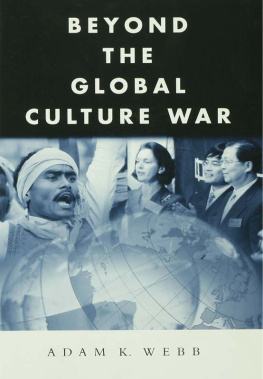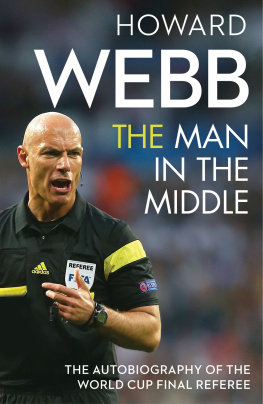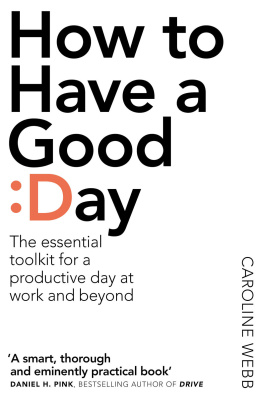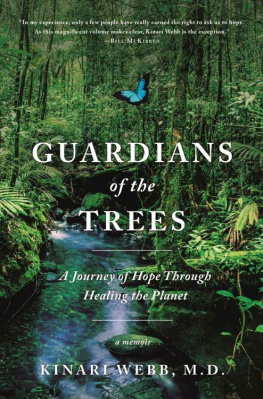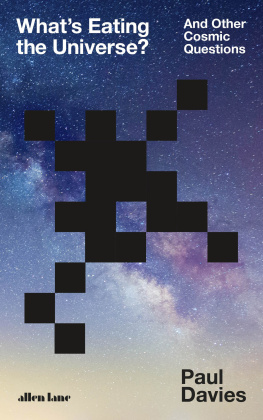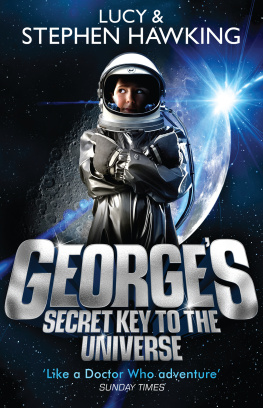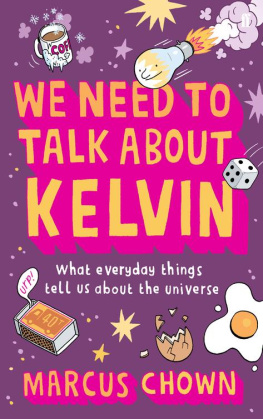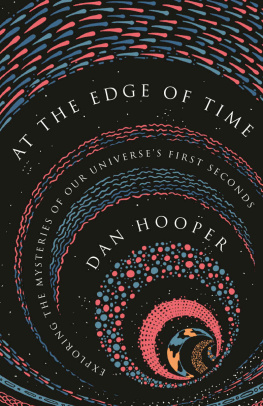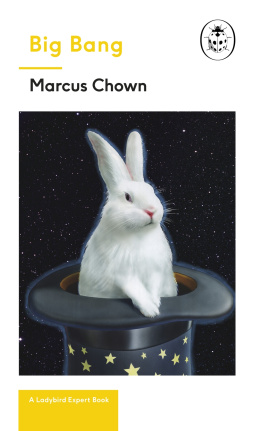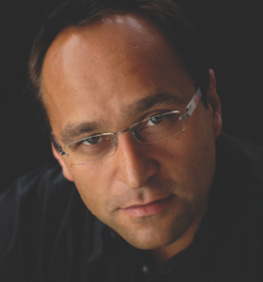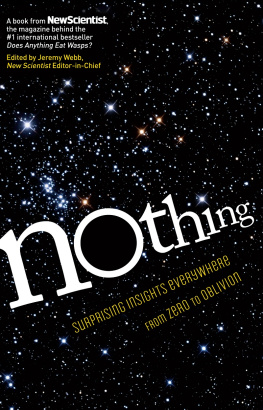nothing
From absolute zero to
cosmic oblivion amazing
insights into nothingness
NewScientist
nothing
From absolute zero to
cosmic oblivion amazing
insights into nothingness
edited by Jeremy Webb

First published in Great Britain in 2013 by
Profile Books Ltd
3 A Exmouth House
Pine Street
Exmouth Market
London EC1R 0JH
www.profilebooks.com
Copyright New Scientist 2013
The moral right of the authors has been asserted.
All rights reserved. Without limiting the rights under copyright reserved above, no part of this publication may be reproduced, stored or introduced into a retrieval system, or transmitted, in any form or by any means (electronic, mechanical, photocopying, recording or otherwise), without the prior written permission of both the copyright owner and the publisher of this book.
A CIP catalogue record for this book is available from the British Library.
eISBN 978 1 84765 915 6
Original New Scientist illustrations redrawn by Cherry Goddard
Contents
Marcus Chown
Douglas Fox
Richard Webb
Jo Marchant
Paul Davies
Michael Brooks
Laura Spinney
Linda Geddes
Per Eklund
Jonathan Knight
Richard Webb
Nigel Henbest
Ian Stewart
Paul Davies
Helen Pilcher
Ian Stewart
David Harris
Ian Stewart
Michael de Podesta
Valerie Jamieson
David E. Fisher
Rick A. Lovett
Andy Coghlan
Michael Brooks
Stephen Battersby
Introduction
Heres a puzzle for you: what do the big bang, a curse of death, mens nipples, antimatter traps, superconductors, penguin chicks and xenon have in common? The answer is, of course, nothing.
That is to say, I dont mean they are unrelated in any way. Quite the opposite. They are all connected by the notion of nothing nada, nichts, niente.
You might think a book about nothing sounds suspiciously like an oxymoron. But fortunately theres plenty to explore, because nothing has been a topic of discussion for more than 2,000 years: indeed, the ancient Greeks had a lively disagreement about it. And such have been the changing fortunes of nothing that you can pretty much tell where you are in history just by finding out the prevailing views on nothing.
Take zero, for example, the symbol for the absence of things. Part of it came into being in Babylonia around 300 BC . The rest of it emerged 1,000 years later when the Indians fused that idea with an ancient symbol for nothingness. Another 400 years passed before it arrived in Europe where it was initially shunned as a dangerous innovation. By the 17th century it had gained acceptance, and today it is critical to the definition of every number you use.
Youll find out about all these events in the pages that follow. But theres much more besides.
The word nothing is applied in all manner of settings and in every case it reveals a different aspect of reality. Can something really come from nothing? Why do some animals spend all day doing nothing? What happens in our brain when we try to think about nothing? These are all questions scientists have asked and gained intriguing results.
In this way, nothing becomes a lens through which we can explore the universe around us and even what it is to be human. It reveals past attitudes and present thinking.
One example is the vacuum, the void, which is what the Greeks argued about all those centuries ago. First it didnt exist, then in the 17th century it did. During the 18th century, it was filled with a mysterious substance called luminiferous aether. That was thrown out at the start of the 20th century. But by 1930, the void had become the vacuum of quantum theory, which is about as far from nothing as you can get it is a space packed with particles popping into and out of existence.
As this example demonstrates, nothings are usually extremes. They tend to sit at one end of a spectrum. And when scientists want to explore a phenomenon they look for an extreme version of it, because the contributory factors are often easier to spot. So if you want to measure the impact of inactivity on the body, you send your subjects to bed for a long time and order them to do absolutely nothing. The results of that particular experiment changed medical practice overnight.
Another extreme is absolute zero, the coldest cold that can exist, where the thermal jiggling of atoms all but disappears. Our journey towards absolute zero has been a tortuous one, filled with misconceptions and blind alleys. Yet the human impulse to explore eventually revealed a world of bizarre behaviours that we could never have predicted.
Nothings can be difficult to attain: we havent reached absolute zero and most likely never will. Nothings can also be messy: what is described as the vacuum of space turns out to be not one, but many. And nothings can be powerful: sick people can get better after talking with a doctor even though nothing material passes between them. This effect, which is perplexing some of the best brains in medical science, has an equally powerful evil twin.
These are just a few ways in which nothing can reveal glimpses of our universe. It would have been relatively easy to corral these stories into chapters themed along conventional lines cosmology, mathematics and so on. But in New Scientist, where most of these essays originated, we have found that variety is highly prized and it is always wise for every issue of the magazine to offer something for everyone.
In that spirit, I have instead created chapters around topics such as beginnings, mysteries and surprises. So if physics is not your bag, it wont be long before you reach something more to your taste. I hope to intrigue you with the sheer breadth of the ways in which nothing has influenced our thinking.
Themes such as the birth and death of the universe, the vacuum, the power of nothing, zero and absolute zero run through the chapters. For those who wish to read all the essays on a specific theme, theres a signpost at the end of each essay pointing you to the next one in the chain.
One use of the word nothing implies a lack of value: if something is insignificant, people say its nothing. That meaning clearly comes from a time before we realised quite how valuable nothing is. I hope I can convince you it is a concept rich in meaning and implication.
Jeremy Webb
1
Beginnings
Astronomy leads us to a unique event, a universe which was created out of nothing, said Arno Penzias, the American physicist and Nobel laureate. He was talking about the mother of all beginnings, the big bang. Its the obvious place for us to start. To add some variety, well bounce you to ancient Babylon and then to the most modern of brain-scanning laboratories. Youll find out about the birth of a symbol that you almost certainly take for granted and discover that your head is home to an organ youve probably never heard of. Along the way, well look at the fruits of an infant scientific field the minds power to heal the body.
The big bang
Our universe began in an explosion of sorts, whats called the big bang. The $64,000 question is how the cosmos emerged out of nothing. But before we tackle that, we need to understand what the big bang entailed. Heres Marcus Chown.
Next page


